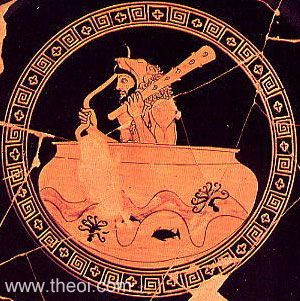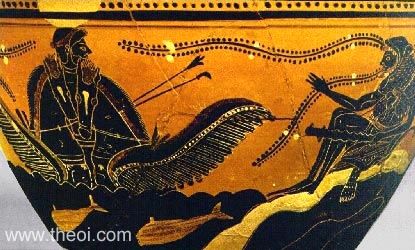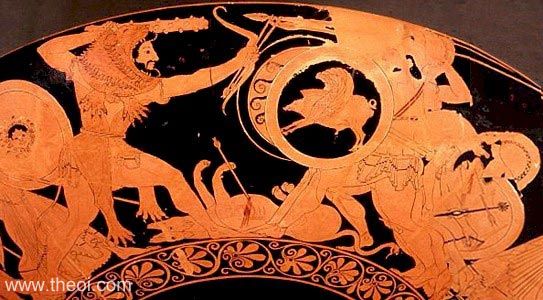ERYTHEIA
Greek Name
Νησος
Ερυθεια
Νησος Ερυθεισ
Transliteration
Nêsos Erytheia
Nêsos Erytheis
Latin Spelling
Nesus Erythea
Nesus Erytheis
Translation
The Red Isle
Red Island

ERYTHEIA the "Red Isle" was an island located in the far western stream of the earth-encircling river Okeanos (Oceanus) which was bathed red by the light of the setting-sun. It was the home of the three-bodied giant Geryon and his fabulous herd of red-hided cattle. Herakles was sent to fetch these as one of his twelve labours and sailed to the island in the cauldron-boat of the sun-god Helios. Menoites (Menoetes), who herded the cattle of Haides on the island, warned Geryon of the hero's approach.
Erytheia was one of several mythical realms located in the far west. Its neighbours included Hesperia, garden of the Hesperides, Sarpedon, isle of the Gorgones, and Leuke the White, home of the blessed dead. Further west on the far shore of the river Okeanos lay the gloomy netherworld realm of Haides.
Late Greek writers identified Erytheia with southern Spain and Hesperia with the Atlantic coast of north-west Africa. The island also shared its name with the Red (Erythraian) Sea between Egypt and Arabia and the two were often confounded.
CLASSICAL LITERATURE QUOTES
ERYTHEIA THE RED ISLE OF SUNSET

Hesiod, Theogony 979 ff (trans. Evelyn-White) (Greek epic C8th or C7th B.C.)
:
"Kallirhoe (Callirhoe), daughter of Okeanos (Oceanus) lying in the embraces of powerful-minded Khrysaor
(Chrysaor) [son of Medousa] . . . bore him a son, most powerful of all men mortal, Geryones, whom Herakles in
his great strength killed over his dragfoot cattle in water-washed Erytheia."
Hesiod, Theogony 287 ff :
"Khrysaor (Chrysaor), married to Kallirhoe (Callirhoe), daughter of glorious Okeanos (Oceanus), was father
to the triple-headed Geryon, but Geryon was killed by the great strength of Herakles at sea-circled Erytheis
(the Red Isle) beside his own shambling cattle on that day when Herakles drove those broad-faced cattle toward
holy Tiryns, when he crossed the stream of Okeanos and had killed Orthos and the oxherd Eurytion out in the
gloomy meadow beyond fabulous Okeanos."
Eumelus of Corinth or Arctinus of Miletus, Titanomachia Fragment 7 (from Athenaeus
11. 470B) (trans. Evelyn-White) (Greek epic C8th B.C.) :
"Theolytos says that he [Herakles] sailed across the sea in a cauldron [i.e. across Okeanos (Oceanus) to
reach Geryon in Erytheia]; but the first to give this story is the author of the Titanomakhia."
Stesichorus, Geryoneis Fragment S7 (from Strabo, Geography) (trans. Campbell, Vol.
Greek Lyric III) (Greek lyric C7th to C6th B.C.) :
"The ancient writers seem to call the Baetis [a river in southern Spain now named Guadalquivir] Tartessos,
and Gadeira [Gades now Cadiz] and the nearby island Erytheia. This, it is supposed, is why Stesikhoros
(Stesichorus) sould say of Geryon's herdman [Eurytion] that he was born' almost opposite famous Erytheia . . by
the limitless silver-rooted waters of the river Tartessos in the hollow of a rock."
Stesichorus, Geryoneis Fragment S17 (from Athenaeus, Scholars at Dinner) (trans.
Campbell, Vol. Greek Lyric III) (Greek lyric C7th to C6th B.C.) :
"Helios (the Sun) too was conveyed to his setting in a cup Stesikhoros tells us in the following words :
‘And then Hyperion's strong child [Helios] went down into the cup of solid gold, so that he might cross
over Okeanos (Oceanus) and reach the depths of holy, dark night . . . while he Zeus' son [Herakles], who has
reached Erytheia in the cup or has traveled back to the mainland in it, now retuns it to Helios went on foot
into the grove, shady with its laurels.’"
Stesichorus, Geryoneis Fragment S17 (from Athenaeus, Scholars at Dinner) :
"Stesikhoros says that Helios (the Sun) sailed across Okeanos (Oceanus) in a cup and that Herakles also
crosssed over in it when travelling to get Geryon's cattle."
Stesichorus, Geryoneis Fragment S86 (from Scholiast on Apollonius Rhodius)
:
"Stesikhoros in his Geryoneis calls an island in the Atlantic sea Sarpedonian." [N.B.
Sarpedon was the island-home of the Gorgones which located in the Okeanos-stream near Erytheia. Geryon himself
was the grandson of the Gorgon Medousa.]
Aeschylus, Fragment 37 Heracleidae (from Scholiast on Aristeides) :
"He [Herakles] crossed Okeanos (Oceanus) in a golden bowl [i.e. the boat of the sun-god Helios], he drave
the straight-horned kine from the uttermost parts of the earth, slew the evil herdsmen [Eurytion] and their
triple-bodied master [Geryon]."
Pseudo-Apollodorus, Bibliotheca 1. 35 (trans. Aldrich) (Greek mythographer C2nd A.D.)
:
"[The Gigante] Alkyoneus (Alcyoneus) who drove away the cattle of Helios (the Sun) from Erytheia (the Red
Isle)." [N.B. In the Odyssey Helios' cattle are herded on the island of Thrinakia not Erytheia.]
Pseudo-Apollodorus, Bibliotheca 2. 106 - 109 :
"The tenth labour assigned to Herakles was to fetch the cattle of Geryon from Erytheia. Erytheia was an
island, now called Gadeira, lying near Okeanos (Oceanus). On it lived Geryon, son of Khrysaor (Chrysaor) and
Okeanos' daughter Kallirrhoe (Callirhoe) . . . He owned crimson-colored cattle, which were herded by Eurytion
and protected by Orthos, the hound with two heads . . . [Herakles] went on to Tartessos where he set up two
steles opposite each other at the borders of Europe and Libya, as commemorative markers of his trip. Then, when
Helios (the Sun) made him hot as he proceeded, he aimed his bow at the god and stretched it; Helios was so
surprised at his daring that he gave him a golden goblet, in which he crossed Okeanos. When he reached Erytheia
he camped on Mount Atlas. The dog smelled him there and went after him, but he struck it with his club, and when
the cowherd Eurytion came to help the dog, he slew him as well. Menoites (Menoetes), who was there tending the
cattle of Haides, reported these events to Geryon, who overtook Herakles by the Athemos river as he was leading
away the cattle. They fought, and Herakles slew Geryon with an arrow. He then loaded the cattle into the goblet,
sailed back to Tartessos, and returned the goblet to Helios."
Herodotus, Histories 4. 8. 1 (trans. Godley) (Greek historian C5th B.C.) :
"Herakles, driving the cattle of Geryones . . . Geryones lived west of the Pontos, settled in the
island called by the Greeks Erytheia, on the shore of Okeanos (Oceanus) near Gadeira, outside the pillars of
Herakles."

Strabo, Geography 3. 2. 11 (trans. Jones) (Greek geographer C1st B.C. to C1st A.D.)
:
"The mountain in which the river Baetis is said to rise [in southern Iberia] is called ‘Silver
Mountain’ on account of the silver-mines that are in it . . . The ancients seem to have called the Baetis
River [of Hispania] ‘Tartessos’; and to have called Gades and the adjoining islands
‘Erytheia’; and this is supposed to be the reason why Stesikhoros (Stesichorus) spoke as he did
about [Eurytion] the neat-herd of Geryon, namely, that he was born ‘about opposite famous Erytheia, beside
the unlimited, silver-rooted springs of the river Tartessos, in a cavern of a cliff.’ Since the river had
two mouths, a city was planted on the intervening territory in former times, it is said,--a city which was
called ‘Tartessos,’ after the name of the river . . . Further Eratosthenes says that the country
adjoining Kalpe (Calpe) is called ‘Tartessis,’ and that Erytheia is called ‘Blest
Island’ (Nesos Eudaimos)."
Strabo, Geography 3. 5. 4 :
"By ‘Erytheia,’ in which the myth-writers place the adventures of Geryon, Pherekydes
(Pherecydes) seems to mean Gades [a city and island off the coast of Southern Iberia (Spain)]. Others, however,
think that Erytheia is the island that lies parallel to this city [Gades] and is separated from it by a strait
of a stadium in width."
Strabo, Geography 3. 2. 13 :
"The poets who came after Homeros keep dinning into our ears similar stories [i.e. myths set in Iberia
(Spain)]: the expedition of Herakles in quest of the kine of Geryon and likewise the expedition which he made in
quest of the golden apples of the Hesperides."
Pausanias, Description of Greece 1. 35. 7 - 8 (trans. Jones) (Greek travelogue C2nd
A.D.) :
"Geryon is at Gadeira, where there is, not his tomb, but a tree showing different shapes."
Philostratus, Life of Apollonius of Tyana 5. 4 (trans. Conybeare) (Greek biography
C1st to C2nd A.D.) :
"The city of Gadeira [in southern Iberia] is situated at the extreme end of Europe . . . They say that the
latter [Herakles of Thebes] penetrated as far as the neighbouring city of Erytheia, on which occasion he took
captive Geryon and his cows; and they say that in his devotion to wisdom he traversed the whole earth to its
limits."
Oppian, Cynegetica 2. 100 ff (trans. Mair) (Greek poet C3rd A.D.) :
"Herakles, the mighty son of Zeus, when fulfilling his labours, drove of old from Erytheia, what time he
fought with Geryoneus beside Okeanos (Oceanus) and slew him amid the crags."
Pliny the Elder, Natural History 4. 36 (trans. Bostock) (Roman encyclopedia C1st
A.D.) :
"Towards Spain [in the Atlantic Ocean], at about 100 paces distance, is another long island, three miles
wide, on which the original city of Gades stood. By Ephorus and Philistides it is called Erythia, by Timaeus and
Silenus Aphrodisias, and by the natives the Isle of Juno [Hera]. Timaeus says, that the larger island used to be
called Cotinusa, from its olives; the Romans call it Tartessos; the Carthaginians Gadir, that word in the Punic
language signifying a hedge. It was called Erythia because the Tyrians, the original ancestors of the
Carthaginians, were said to have come from the Erythraen, or Red Sea. In this island Geryon is by some thought
to have dwelt, whose herds were carried off by Hercules [Heracles]. Other persons again think, that his island
is another one, opposite to Lusitania, and that it was there formerly called by that name."
Seneca, Hercules Furens 231 ff (trans. Miller) (Roman tragedy C1st A.D.) :
"[The labours of Heracles :] Among his herds in the distant land of Hesperia the three-shaped shepherd
[Geryon] of the Tartesian shore was killed and his cattle driven as spoil from the farthest west; Cithaeron has
fed the herd once to Oceanus known."
SOURCES
GREEK
- Hesiod, Theogony - Greek Epic C8th - 7th B.C.
- Epic Cycle, Titanomachia Fragments - Greek Epic C8th B.C.
- Greek Lyric III Stesichorus, Fragments - Greek Lyric C7th - 6th B.C.
- Aeschylus, Fragments - Greek Tragedy C5th B.C.
- Herodotus, Histories - Greek History C5th B.C.
- Apollodorus, The Library - Greek Mythography C2nd A.D.
- Strabo, Geography - Greek Geography C1st B.C. - C1st A.D.
- Pausanias, Description of Greece - Greek Travelogue C2nd A.D.
- Philostratus, Life of Apollonius of Tyana - Greek Biography C2nd A.D.
- Oppian, Cynegetica - Greek Poetry C3rd A.D.
ROMAN
- Pliny the Elder, Natural History - Latin Encyclopedia C1st A.D.
- Seneca, Hercules Furens - Latin Tragedy C1st A.D.
BIBLIOGRAPHY
A complete bibliography of the translations quoted on this page.